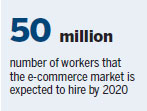E-commerce industry set to boost traditional enterprises
E-commerce companies said they will make great efforts to boost traditional enterprises and upgrade the real economy as the government published plans to develop e-commerce business during the 13th Five-Year Plan (2016-20).
The plan has set goals to increase the trading volume of e-commerce to 40 trillion yuan ($5.76 trillion) by 2020, including 10 trillion yuan from online retail businesses. The e-commerce market is expected to employ 50 million people by the end of 2020, according to the plan.
The plan also set out five tasks to expand the e-commerce market, such as speeding the upgrading of e-commerce, promoting the deep integration of e-commerce with traditional industry, improving the public service system of e-commerce and optimizing the governance of e-commerce.
JD.com Inc, China's second-largest e-commerce player, said the plan is to improve the quality and promote the upgrading of e-commerce, which will play an important role in driving the transformation of real economy, deepening supply-side reform and achieving the integration of the internet and the real economy.
The company said cutting-edge technologies, including big data, cloud computing, artificial intelligence and intelligent hardware, will help the development of e-commerce. And, e-commerce players will utilize new technologies extensively during the period of the plan.

Chinese cross-border B2B e-trade company DHgate said: "The plan is put forward to promote the deep integration of e-commerce with traditional industries. We have built bridges for small and medium-sized enterprises to enter overseas markets since 2004."
In the future, DHgate will help traditional enterprises transform and upgrade, as well as find new growth points for the country's foreign trade.
China is the world's largest e-commerce market, with e-commerce market turnover reaching 16.4 trillion yuan. The turnover of the online shopping market reached 3.8 trillion yuan last year, according to iResearch Consulting Group.
E-commerce will help drive innovation in healthcare, education, culture and tourism, becoming a key engine for economic growth, according to the plan. Moreover, the plan promotes the development of cross-border e-commerce.
Kaola, a shopping platform run by online gaming services provider NetEase Inc, said the plan is good news for cross-border e-commerce and beneficial for the whole industry's healthy and high-efficient development.
The company plans to cultivate specialized talent in cross-border e-commerce and to continue to create more employment opportunities, and boost the skills of employees.
Lu Zhenwang, CEO of the Shanghai-based Wanqing Consultancy, said the plan offers a clear development target for e-commerce and indicates the direction for its future development.
"The next step should be how to better integrate traditional industry with e-commerce," Lu said.
fanfeifei@chinadaily.com.cn
(China Daily 01/03/2017 page13)








